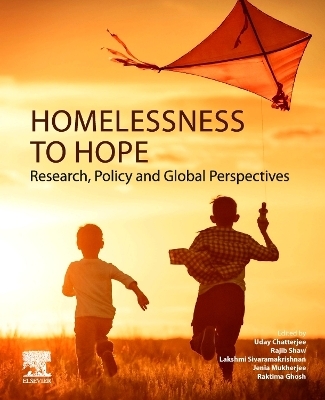
Homelessness to Hope
Elsevier - Health Sciences Division (Verlag)
978-0-443-14052-5 (ISBN)
Dr. Uday Chatterjee is an Assistant Professor at Bhatter College in Dantan, Paschim Medinipur, West Bengal, India, and an Applied Geographer with a Post-Graduate in Applied Geography from Utkal University and a Doctorate in Applied Geography from Ravenshaw University in Cuttack, Odisha. He has contributed to a number of research papers that have been published in reputable national and international publications, as well as edited book volumes. He has also organized (as the convener) a Faculty Development Program on "Modern ways of teaching and advanced research methods," which was funded by the Indian Council of Social Science Research (ICSSR). Urban Planning, Social and Human Geography, Applied Geomorphology, Hazards & Disasters, Environmental Issues, Land Use and Rural Development are some of his research interests. The West Bengal Pollution Control Board (WBPCB) of the Government of West Bengal, India, financed his research. He has worked as a reviewer for a number of international publications. Dr. Uday Chatterjee is currently the lead editor of the Springer Special Issue (S.I) on Urbanism, Smart Cities, and Modelling. Dr. Rajib Shaw is a professor at Keio University's Graduate School of Media and Governance. He is also the Chairperson of SEEDS Asia and CWS Japan, two Japanese NGOs, and a Senior Fellow of the Institute of Global Environmental Strategies (IGES) Japan. He was previously the Executive Director of the Integrated Research on Disaster Risk (IRDR) and a Kyoto University Professor. Disaster governance, community-based disaster risk management, climate change adaptation, urban risk management, and disaster and environmental education are all areas of interest for him. Professor Shaw is the Chair of the UN Science Technology Advisory Group for Disaster Risk Reduction (STAG) and the Co-Chair of the Asia Science Technology Academic Advisory Group (ASTAAG). He's also the CLA (Coordinating Lead Author) for the IPCC's 6th Assessment Report's Asia chapter. He is the editor-in-chief of the journal "Progress in Disaster Science" published by Elsevier, as well as the series editor of a Springer book series on disaster risk reduction. Prof. Shaw has over 45 books to his credit, as well as over 300 scholarly papers and book chapters. Prof. Lakshmi Sivaramakrishnan is the founder of the Geography Department at Jadavpur University. She has taught at North Bengal University and The University of Burdwan as full time Faculty and as Guest Faculty at the University of Tripura, WBSU, Calcutta University, Kalyani University. She is an Urban Geographer who combines the strengths of Regional Planning and Human Geography. She has 60 research papers and 3 books to her credit. She has delivered lectures across Universities in India. She has taken up projects under UGC and has been supervising several research fellows. She has guided more than 20 scholars who have obtained their doctoral degree and has also supervised several MPhil scholars. She is on the editorial board of many renowned journals such as Hill Geographer, Regional Science Policy and Practice, RSAI, Indian Journal of Regional Science and at present is the Editor of Geographical Review of India, Kolkata. Dr. Jenia Mukherjee is an Assistant Professor at the Department of Humanities and Social Sciences, Indian Institute of Technology Kharagpur. Her research interests span across urban studies and environmental history. She received the Australian Leadership Awards Fellowship in 2010 and 2015. She published the book Blue Infrastructures: Natural Ecology, Political History and Urban Development in Kolkata and has widely published in peer-reviewed journals including Environment and Planning E, International Journal of Urban Sustainable Development, Urban Research and Practice, as well as book chapters. She is a member of the Editorial Advisory Board for Routledge’s Equity, Justice and the Sustainable City series edited by Julian Agyeman. Raktima Ghosh is a Doctoral Researcher at the Rekhi Centre of Excellence for the Science of Happiness, Indian Institute of Technology Kharagpur. A part of the Global Partnership Project undertaken by University of Manitoba and funded by SSHRC (Canada), her doctoral work focuses on dried fish social economy and fisheries governance in coastal West Bengal. Specifically, she explores the transdisciplinary possibilities to design solution-focused pathways through applying a participatory approach in dried fish research. Broad areas of her research include environmental governance, fish value chains, social ecological systems, and human geography.
Section I: Introduction 1. Home, Homeless and Homelessness 2. The Colonial shadows of homelessness Section II: Rural Urban Homelessness and Socioecological Drivers 3. Urbanization and homelessness 4. Processes of homelessness: linking rural-urban scenarios 5. Planetary and ecological drivers of homelessness Section III: Homelessness and Social Stress 6. Homelessness and Poverty 7. Homelessness, Quality of life and Health 8. Homelessness, Climate Change and Social distress-Case Study Section IV: Homelessness, Governancy Policy and Sustainable Solution 9. Homelessness in governance, economy, and policies 10. Solution-oriented pathways and recommendations 11. Homelessness to Hope: An Eco-Friendly Solution for Sustainable Development Section V: Conclusions 12. Concluding chapter
| Erscheinungsdatum | 20.04.2024 |
|---|---|
| Verlagsort | Philadelphia |
| Sprache | englisch |
| Maße | 191 x 235 mm |
| Gewicht | 1070 g |
| Themenwelt | Naturwissenschaften ► Biologie ► Ökologie / Naturschutz |
| Naturwissenschaften ► Geowissenschaften ► Geografie / Kartografie | |
| Sozialwissenschaften | |
| ISBN-10 | 0-443-14052-9 / 0443140529 |
| ISBN-13 | 978-0-443-14052-5 / 9780443140525 |
| Zustand | Neuware |
| Haben Sie eine Frage zum Produkt? |
aus dem Bereich


